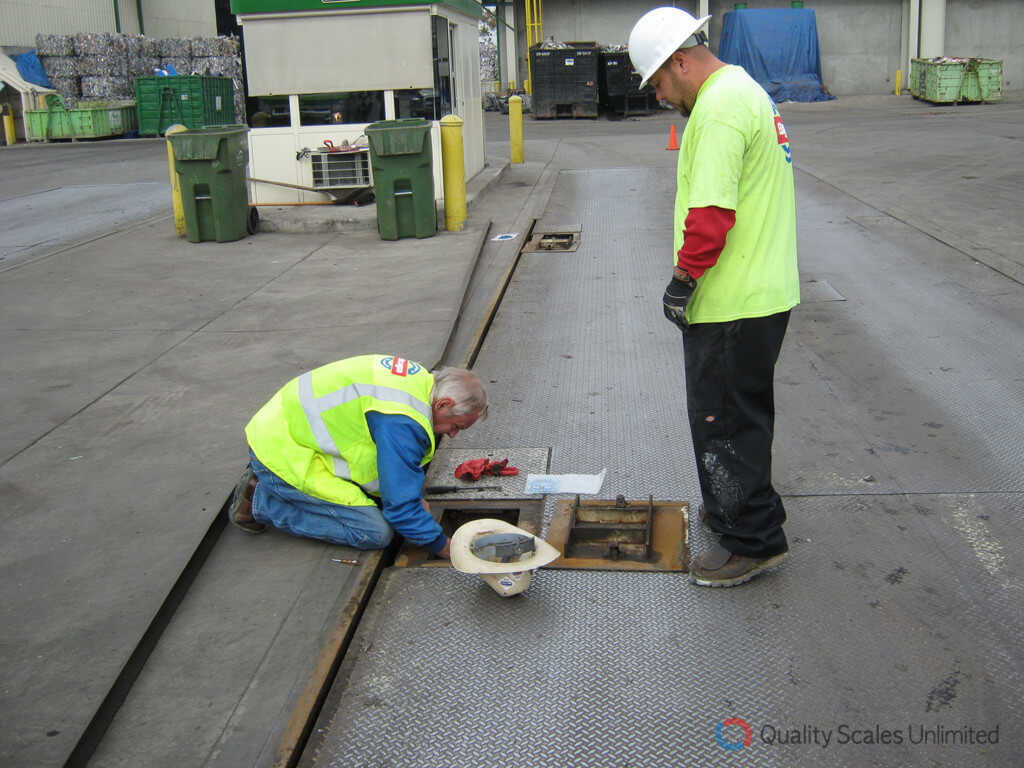
Truck scales are important components in several industries. Scale calibration and maintenance helps cut down repair costs and prolong the life of the scale. Depending on the environment and conditions the scale is being implemented in, the scale can lose its calibration faster.
Eight Checks You Can Do Between Calibrations
- Examine the General Scale Condition: The general condition of the scale is important. Look at whether the scale is level, rubbing against something or leaning in any direction. It is also important to check if there is corrosion on any components in the scale. If you see any of these issues, it can mean that your scale is no longer weighing accurately.
- Inspect Deck and Supporting Frame: One of the most expensive parts of the truck scale is the deck. It is a good idea to exam the deck in case you spot anything that seems like a potential problem. In some cases, the damage is not repairable and you may have to replace the entire deck.Check for the structural integrity of the supporting frame as well. If there are broken welds, excessive cracking, corrosion, rusting and warped steel, it indicates a structural issue. Addressing problems at the first sign of these issues can save you money on scale repair.
- Check the End Bumper Gaps: The maximum distance between the end bumpers and the pit wall should not be more than quarter of an inch. Ensure the end bumpers are not rubbing against the wall but that they are not too far from the wall as well. It is recommended that you check on the end bumper gaps at least twice a year.
- Keep The Scales Debris-Free: Debris such as dirt, snow, water or ice can build up in the cracks or around the load cells. Even a small amount of debris can cause the weight of the product being measured to be off by hundreds of pounds. If the scale is used in a dusty environment or in a cold place, constantly checking for debris and cleaning any off of the scale can prevent accuracy issues.Load cells need adequate clearance for error-free deflection through their range of capacity but the accumulation of dirt and debris keeps suspended components and load cells from moving freely. Load cell cables and seal should also be inspected for damage and deterioration. When exposed to humidity and moisture, the copper wires in the load cell cables tend to corrode, resulting in signal distortion. A certified scale calibration service can help ensure that your scale is free from debris and moisture so it works efficiently all year round.
- Check for Rodent Damage on Cabling: Rodents can cause significant damage to the cabling and grounding of the scales. Most of the truck scales are placed in a pit or are less than 12 inches above the ground, making it easily accessible to rodents. As a part of industrial scale calibration, checking for frayed, chewed or pinched wires is standard. Placing rodent traps can prevent them from attacking the cables.
- Track the Flow of Traffic: When trucks drive on and off the scale at varying speeds, their sudden movements and abrupt stops send shockwaves through the load cells. While industrial truck scales are designed to function efficiently in a robust environment, the heavy flow of traffic eventually takes a toll on the key components. Keeping a check on the traffic flow is an easy way to extend the service life and accuracy of truck scales while keeping untimely scale repairs at bay. This can be done by installing traffic gates and lights that are designed to ensure truck drivers bring the vehicle to a complete halt before they drive off.
- Know how the Scale Functions: Knowing how the scale works and which parts of the scale are most likely to wear over time, will help you identify small issues before they become big and invite expensive scale repairs and replacements.
- Check the Junction Box: A common problem seen in junction boxes is the internal condensation that is caused by moisture. If the moisture goes undetected, there is a risk of wiring terminals and other enclosure components getting corroded. Installing a junction box with a fiberglass-reinforced polyester enclosure will help. Even a desiccant bag in the enclosure can help control moisture.
Having a preventative maintenance contract with a scale service provider can help spot these problems and prevent further damage. By repairing the scale at the first signs of these issues, you can prolong the life of the scale and help you avoid any major and costly repairs. Contact us at Quality Scales Unlimited and we will be happy to assist you in any way we can.




